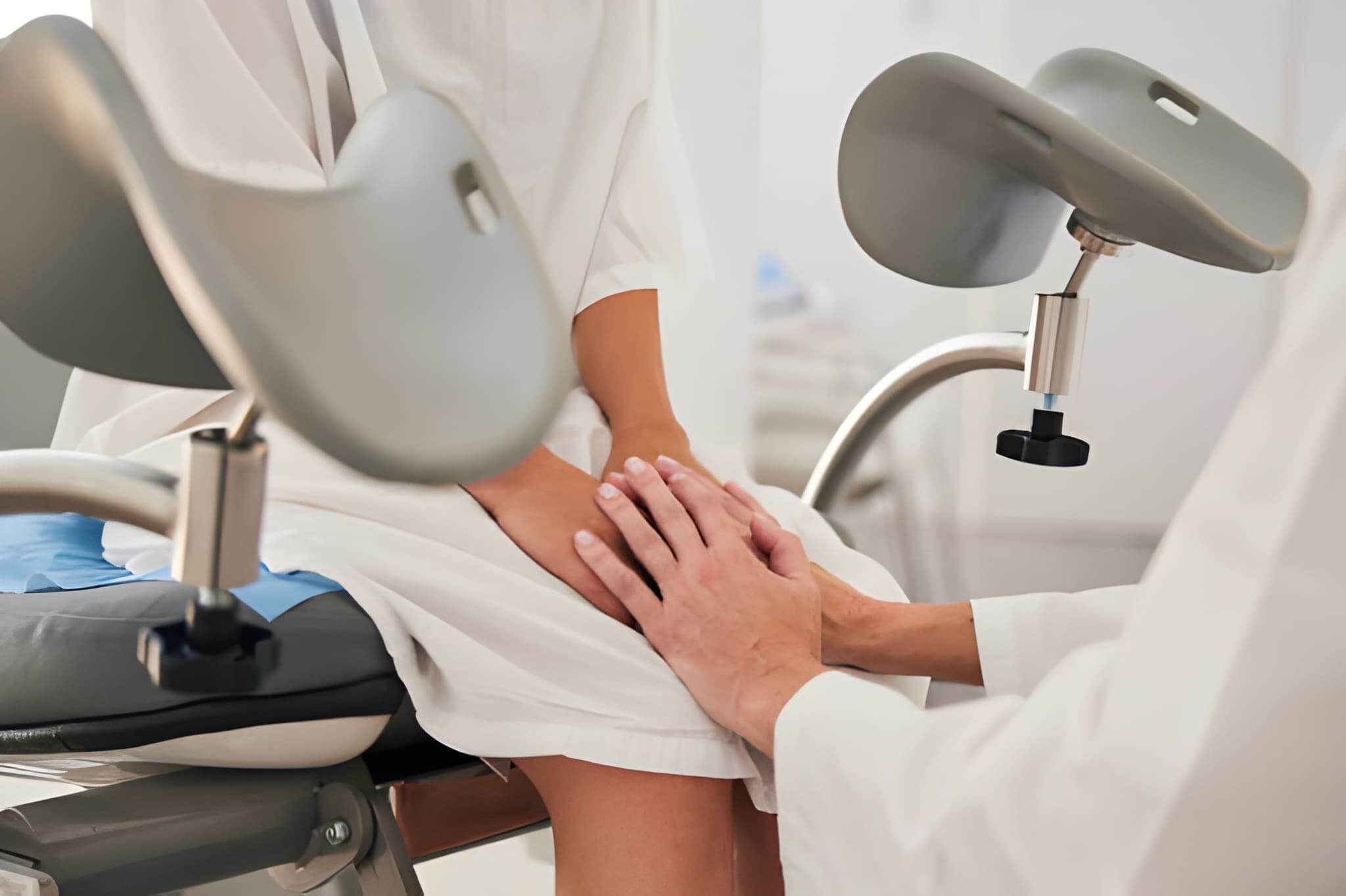A Pap smear cannot detect pregnancy, but it can safely be done during pregnancy. While a Pap test screens for cervical cell changes, it does not measure hormones or confirm conception. Here’s what Hartford patients should know about Pap smears, early pregnancy, colposcopy during pregnancy, and what happens if you have an abnormal Pap while pregnant.
Understanding What a Pap Smear Really Tests For
A Pap smear—often called a Pap test—is used to check for changes in cervical cells that may lead to cervical cancer. It may also detect HPV-related abnormalities, inflammation, or infection.
But many Hartford patients wonder:
Would a Pap smear show pregnancy?
Can a Pap test detect pregnancy accidentally?
The answer is no. A Pap smear is not designed to diagnose pregnancy. It does not analyze hCG (the pregnancy hormone) or uterine changes that confirm pregnancy.
However, some indirect hints may appear—such as increased cervical mucus or hormonal cell changes—but these are not definitive.
Can a Pap Smear Detect Pregnancy?
Direct Answer
No.
A Pap smear cannot detect pregnancy and should not be used as a pregnancy test.
Why?
A Pap test examines:
-
Cervical cells
-
Abnormal cell changes
-
HPV-related findings
-
Signs of infection
It does not examine:
-
hCG levels
-
Uterine tissue
-
Embryo presence
-
Hormonal changes are used to confirm pregnancy
So while some patients ask:
-
Can a smear detect pregnancy?
-
Can a Pap test show pregnancy?
-
Would a Pap smear detect pregnancy?
The clinical answer is always: No, it cannot.
Can a Pap Smear Accidentally Reveal Pregnancy?
Sometimes, a clinician may see cervical changes commonly seen in pregnancy—such as a softer cervix or increased vascularity. But these findings:
-
Are not reliable
-
Are not diagnostic
-
May occur for other reasons
So even if a clinician suspects pregnancy, they would confirm it with:
-
A urine pregnancy test
-
A blood hCG test
-
An ultrasound (if indicated)
A Pap smear alone cannot confirm pregnancy.
Pap Smears During Pregnancy: Are They Safe?
Yes.
You can get a Pap smear while pregnant. Women often ask:
-
Can you do a Pap smear while pregnant?
-
Can you get a Pap test while pregnant?
-
Can you have a Pap smear while pregnant?
-
Can you get a Pap smear while pregnant during the first trimester?
The answer is yes to all.
A Pap smear during pregnancy is:
-
Safe
-
Routine
-
Recommended if you are due for screening
Why it’s safe
The clinician only collects cells from the surface of the cervix. The cervix is external to the pregnancy and does not affect the uterus or fetus.
Can a Pap Smear Cause a Miscarriage?
This is one of the most common fears.
Short answer:
No. A Pap smear cannot cause a miscarriage in early pregnancy or later pregnancy.
It involves:
-
No sharp instruments
-
No penetration beyond the cervix
-
No disruption of the uterus or placenta
Spotting after a Pap smear while pregnant is normal due to increased blood flow to the cervix. This does not mean anything is wrong.
What If You Have an Abnormal Pap Smear During Pregnancy?
Receiving an “abnormal” result while pregnant can be frightening. But it does not mean cancer. More commonly, it indicates:
-
HPV-related changes
-
Low-grade cell abnormalities
-
Inflammation
-
Benign cervical changes
Your clinician will decide whether surveillance or further testing is needed.
Colposcopy During Pregnancy: Is It Safe?
If your Pap test is abnormal during pregnancy, your clinician may recommend a colposcopy.
Many patients ask:
-
Is colposcopy during pregnancy safe?
-
Can you have a colposcopy while pregnant?
Yes. Colposcopy is safe during pregnancy.
It allows the clinician to examine the cervix more closely using a magnifying scope.
What it does NOT do:
-
It does NOT harm the baby
-
It does NOT enter the uterus
-
It does NOT cause miscarriage
In most cases, cervical biopsies during pregnancy are also safe, though your clinician will evaluate carefully.
Pregnancy Pap Test: What Can You Expect?
A Pap test while pregnant feels similar to a non-pregnant Pap, but because the cervix is more sensitive, you may experience:
-
More spotting
-
Mild cramping
-
Slight increased discomfort
These effects are temporary and normal.
Do You Still Need Pap Screening During Pregnancy?
Yes—if you’re due for screening.
ACOG recommends Pap testing:
-
Every 3 years (Pap only)
-
Every 5 years (Pap + HPV co-testing)
Pregnancy is actually a convenient time for cervical cancer screening because you’re already receiving consistent prenatal care.
In Hartford, many prenatal visits include screenings to ensure both the parent and the baby are safe throughout pregnancy.
Can an Abnormal Pap Test Affect Pregnancy?
Most of the time, no.
Abnormal Pap results during pregnancy rarely influence:
-
Fetal development
-
Placental health
-
Labor or delivery
Most cervical cell changes can be monitored until after delivery. Many improve on their own postpartum as hormones normalize.
Understanding Abnormal Pap Results While Pregnant
Common findings include:
-
ASC-US (Atypical Squamous Cells of Undetermined Significance)
-
LSIL (Low-Grade Squamous Intraepithelial Lesion)
-
HSIL (High-Grade Squamous Intraepithelial Lesion)
-
HPV-positive results
How they’re handled:
-
Low-grade changes: Usually monitored
-
High-grade changes: May need colposcopy
-
Severe findings: Rarely require intervention during pregnancy
Your clinician will tailor recommendations to protect both your health and your pregnancy.
Why Some Women Think Pap Smears Detect Pregnancy
There are a few reasons the misconception exists:
1. The timing overlaps
Many women get Pap smears during early pregnancy visits.
2. Cervical changes mimic pregnancy signs
The cervix may:
-
Look softer
-
Appear more vascular
These are pregnancy-like, but not diagnostic.
3. Some clinicians order pregnancy tests alongside Pap tests
This leads to confusion about which test showed what.
4. Older medical myths persist online
Outdated information still circulates, even though modern Pap technology is very specific.
Pap Smears vs. Pregnancy Tests: Key Differences
| Pap Smear | Pregnancy Test |
|---|---|
| Checks cervical cells | Checks hCG hormone |
| Screens for cancer risk | Confirms pregnancy |
| Cannot detect pregnancy | Detects pregnancy reliably |
| Recommended every few years | Used anytime pregnancy is suspected |
A Pap smear should never be used as a pregnancy test.
When to See a Hartford Clinician
Schedule an appointment if:
-
You’re due for a routine Pap smear
-
You’re pregnant and unsure whether you need screening
-
You had an abnormal Pap in the past
-
You’re experiencing spotting or unusual discharge
-
You need an evaluation for cervical changes during pregnancy
Hartford patients can receive compassionate, evidence-based evaluation and follow-up with a clinician experienced in prenatal care and cervical health, such as Meghan Killilea Galli, APRN, FNP-BC.
Final Thoughts: Can a Pap Smear Detect Pregnancy?
The bottom line is simple:
A Pap smear cannot show, detect, or diagnose pregnancy.
But Pap tests are:
-
Safe during pregnancy
-
Important for your cervical health
-
Useful for catching concerns early
-
Often performed as part of prenatal care
If you’re pregnant, trying to conceive, or due for screening, your Hartford women’s health clinician can guide you through the right tests at the right time.
Disclaimer: This is informational content, not a substitute for professional medical advice.

Meghan Killilea Galli, APRN, FNP-BC, is a Connecticut-based board-certified Family Nurse Practitioner with over 5 years of experience in urology, women’s pelvic health, and primary care. She practices with Hartford HealthCare and Griffin Faculty Practice Plan and founded Health Gardeners to share reliable, evidence-based health information.
Read More
